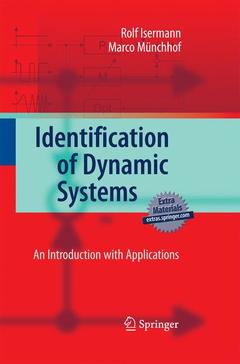Identification of Dynamic Systems, 2011 An Introduction with Applications
Auteurs : Isermann Rolf, Münchhof Marco

Introduction .- Mathematical Models of Linear Dynamic Systems and Stochastic Signals
Part I: Identification of Non-Parametric Models in the Frequency Domain - Continuous Time Signals
Part II: Identification with Non-Parametric Models - Continuous and Discrete Time
Part III: Identification with Parametric Models - Discrete Time Signals
Part IV: Identification with Parametric Models - Continuous Time Signals
PartV: Identification of Multi-Variable Systems
Part VI: Identification of Non-Linear Systems
Part VII: Miscellaneous Issues
Part VIII Applications
Part IX Appendix.
Rolf Isermann studied Mechanical Engineering and obtained the Dr.-Ing. degree in 1965 from the University of Stuttgart. In 1968 he became "Privatdozent" for Automatic Control and since 1972 Professor in Control Engineering at the University of Stuttgart. From 1977-2006 he was Professor for Control Systems and Process Automation at the Institute of Automatic Control of the Darmstadt University of Technology. Since 2006 he is Professor emeritus and is head of the Research Group of Control Systems and Process Automation. R. Isermann received the Dr. h.c. (honoris causa) from L'Université Libre de Bruxelles and from the Polytechnic University in Bucharest. In 1996 he was awarded the “VDE-Ehrenring”, and in 2007 the “VDI-Ehrenmitglied”. The MIT Technology Review Magazine awarded him in 2003 to the Top Ten representatives of emerging Technologies for the field of Mechatronics. R. Isermann has published books on Modeling of Technical Processes, Process Identification, Digital Control Systems, Adaptive Control Systems, Mechatronic Systems, Fault Diagnosis Systems, Engine Control and Vehicle Drive Dynamics Control. Current research concentrates on the fields of identification and digital control of nonlinear systems, intelligent control and model-based methods of process fault diagnosis with applications to servo systems, fault-tolerant systems, combustion engines, automobiles and mechatronic systems. The research group on combustion engines works on multivariable engine modeling, HiL-simulation, combustion pressure control and fault diagnosis of both, CR-Diesel engines and FSI-gasoline engines. In the vehicle dynamics group present topics are parameter estimation for drive dynamics control, fault detection of sensors, suspensions, tires and brake systems and the development of collision avoidance systems with surrounding sensing and active braking and steering. The first books on system identification were published in German and date back to 1971, 1974, 1988, an
Date de parution : 11-2014
Ouvrage de 705 p.
15.5x23.5 cm
Date de parution : 12-2010
Ouvrage de 705 p.
15.5x23.5 cm
